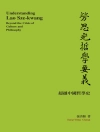An encounter between Franke’s philosophy of the unsayable and Eastern apophatic wisdom in the domains of poetry, thought, and culture.
In Apophatic Paths from Europe to China, William Franke brings his original philosophy of the unsayable, previously developed from Western sources such as ancient Neoplatonism, medieval mysticism, and postmodern negative theology, into dialogue with Eastern traditions of thought. In particular, he compares the Daoist Way of Chinese wisdom with Western apophatic thought that likewise pivots on recognizing the nonexistent, the unthinkable, and the unsayable. Leveraging François Jullien’s exegesis of the Chinese classics’ challenge to rethink the very basis of life and consciousness, Franke proposes negative theology as an analogue to the Chinese model of thought, which has long been recognized for its special attunement to silence at the limits of language. Crucial to Franke’s agenda is the endeavor to discern and renew the claim of universality, rethought and reconfigured within the predicament of philosophy today considered specifically as a cultural or, more exactly, intercultural predicament.
Table des matières
List of Illustrations
Preface and Argument
Historical-Autobiographical Introduction
Introduction to an Intercultural Philosophy of Universalism
Acknowledgments
1. All or Nothing? Nature in Chinese Thought and the Apophatic Occident
The Nature of Dao, or the Dao of Nature
In Praise of Blandness: Litotes of the Neuter
Transcendence and Immanence of the Dao
Mencius, or the Naturalness of Morality: Is the All without Transcendence?
2. Nothing and the Poetic ‘Making’ of Sense
The Art of Effectiveness: Doing or Saying Nothing
Poetic Approaches to the Limit of Expression
Neo-Daoism and Neoplatonism: An Uncanny Historical Parallel
Western Apophatic Poetics
One and Other, All or Nothing, East and West
The Absolutely Other and the Movement of Transcendence
(Negative) Metaphysics (or Pre-Physics) as Poetry
Coda on Chinese Expression of Negativity
3. Immanence: The Last Word?
From Figures of Immanence to Formless Transcendence: The Yijing and Negative Theology
Immanence and the Ineffable
The Matter of Method in Intercultural Philosophy
China and the Sense of Transcendence
Secular Self-Critique and Theological Transcendence
New Debates on the Relevance of Transcendence to Classical Chinese Thinking
Reality That Representation Fails to Represent
4. Universalism, or the Nothing That Is All
From the Globalism of Nature to the Universality of Thought
Historical Permutations of the Non-natural Universality Forged by Thought
Beyond Cultural Relativity and the Construction of Universality
Transcendent Universality and the Negative Way: Reclaiming the Enlightenment for Religion
Universality in the (Apophatic) Gap between China and the West
The Common Broken(open)ness of Cultures
The Self-Negation of Culture by (Negative) Theology
5. An Extra Word on Originality
Epilogue Intercultural Dia-logue and Its Apophatic Interstices
Appendix Analytic Table of Contents
Index
A propos de l’auteur
William Franke is Professor of Comparative Literature at Vanderbilt University and the author of many books, including A Philosophy of the Unsayable.












